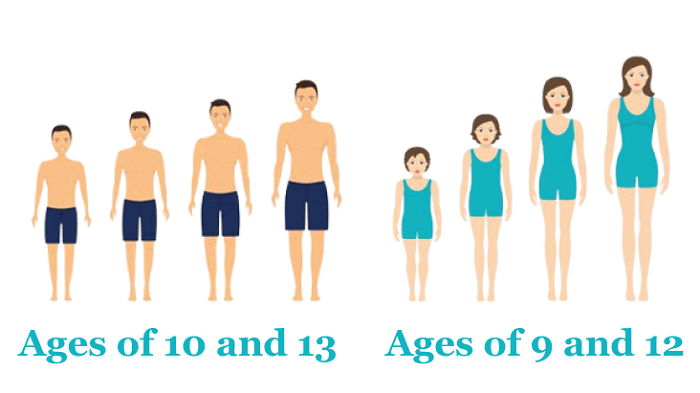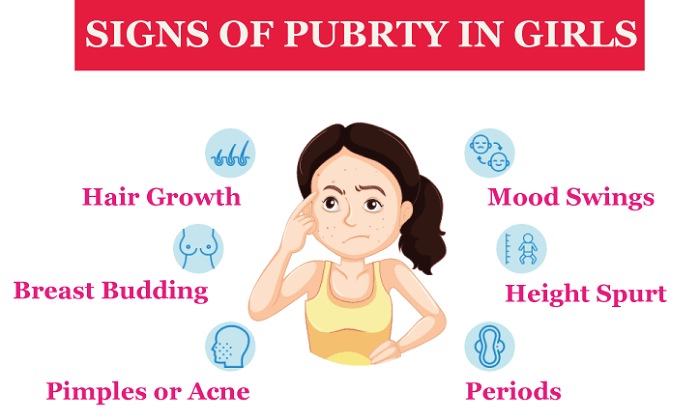Puberty DefinitionEvery person goes through puberty, which is a natural and unavoidable process. It is the age at which a child's body begins to develop into the body of an adult. Puberty is a complex process that includes both physical and emotional changes. It can be a difficult and confusing time for both boys and girls, but understanding the changes can help them navigate this transition with confidence and self-awareness. 
Physical Changes in PubertyThe most obvious and visible signs of puberty are physical changes. The pituitary gland present in the brain produces hormones that cause such physical changes in the body. Hormones cause the reproductive organs in both boys and girls to produce more testosterone and oestrogen. These hormones are in charge of secondary sex development. 1. Growth Spurts
Physical changes are the most visible and obvious signs of puberty. The pituitary gland in the brain produces hormones that lead to such changes. Hormones cause the reproductive organs of both boys and girls to produce more testosterone and oestrogen. These hormones are in charge of secondary sex development. 2. Body HairBody hair grows during puberty, which is a secondary sex characteristic. Hair grows on the faces, chests, arms, legs, and pubic areas of boys. Hair grows under the arms, specifically in the arm hole of the female, and also in the pubic area. In boys, testosterone stimulates hair growth, whereas, in girls, oestrogen stimulates hair growth. 3. Breast DevelopmentGirls' breast development is a visible sign of puberty. Breasts begin to form around the age of 8-10 years old and continue to develop until the age of 18. Breasts vary in size and shape from person to person. The release of oestrogen in the body is responsible for breast development. 4. MenstruationMenstruation is a natural occurrence in females during puberty. Mensuration is basically the removal of the uterine lining. Menstruation typically begins between the ages of 11 and 14 and lasts usually between three and seven days. It denotes that a girl's body is capable of bearing a child. Menstruation is caused by the body's release of hormones. 5. Voice ChangesIn boys, voice changes are an obvious sign of puberty. During puberty, the larynx (or voice box) expands, causing the voice to deepen. Voice changes begin around the age of 12 and last for two to three years. 
Emotional Changes in PubertyPuberty involves more than just physical changes. It also includes emotional changes, which can be as difficult as physical changes. Puberty hormonal changes can cause mood swings, irritability, and emotional sensitivity. Understanding these changes can assist children in navigating this period more easily. 1. Increased EmotionsDuring puberty, children experience numerous physical and emotional changes. These changes can be challenging to navigate and can sometimes lead to increased emotions and mood swings. Children may become more sensitive, emotional, and easily upset as they try to adjust to the new changes in their bodies and minds. One of the most important things parents and caregivers can do during this time is to be understanding and supportive. It is important to acknowledge and validate a child's feelings and provide them with a safe and supportive environment to express themselves. This can help children feel more comfortable and confident as they see the changes of puberty. Parents can also encourage their children to talk about their feelings and emotions. This can help them develop a better understanding of their own emotions and learn healthy ways to cope with them. Encouraging children to participate in physical activities or hobbies can also help them manage their emotions and reduce stress. It is important for parents to remember that mood swings and emotional changes are normal during the time of puberty. Children may experience a range of emotions, from happiness to sadness to anger, and this is completely normal. However, if a child is experiencing significant emotional difficulties, seeking professional help may be necessary. A therapist or counselor can provide guidance and support during this time, helping children to work through their feelings and develop healthy coping strategies. 2. Developing Self-IdentityPuberty is a period in children's lives when they begin to develop a sense of self-identity. They begin to doubt their own beliefs, values, and viewpoints. They may also develop their own opinions and sense of style. This is an important time for children to develop a strong sense of self that will guide them through their adolescence. 3. Developing Social SkillsPuberty is also a time when children's social skills begin to develop. They begin to show an increased interest in friendships and relationships. Crushes and romantic feelings may also emerge. Parents and carers must encourage positive social interactions and offer advice on healthy relationships. 4. Body Image and Self-EsteemPuberty can also have an impact on body image and self-esteem. As they go through the puberty physical changes, children may become more self-conscious about their physical appearance. This can lead to low self-esteem and dissatisfaction with one's body. Parents and carers must provide positive reinforcement and support during this time. Tips for Navigating PubertyPuberty can be a big challenge for both children and their parents. Here are some tips for navigating this transition with ease: 1. Open and Honest CommunicationIt is critical to have open and honest conversations with your child about puberty. Begin the conversation as soon as possible, and be prepared to respond to any questions they may have. Pay attention to your child's feelings and validate them. 2. Support and EncouragementPuberty can be a difficult time for children, so it is critical that they receive support and encouragement. Encourage them to express their emotions and give them positive reinforcement. Tell them that what they are experiencing is normal and that you are there to help them. 3. Educate YourselfIt is critical to educate yourself on the physical and emotional changes that take place during puberty. This will assist you in understanding what your child is going through and providing the necessary support. 4. Seek Professional HelpPuberty is a natural and complicated process that can be difficult and confusing for children. Physical and emotional changes can have a big impact on a child's well-being and self-esteem. It is critical for parents and carers to be aware of these changes and to provide their children with the support and guidance they require during this time. Maintaining open and honest communication is one of the most important ways to support children during puberty. Parents should be willing to discuss the physical and emotional changes that occur during puberty with their children and answer any questions they may have. It is critical to provide accurate information in an age-appropriate and understandable manner. This can make children feel better. Parents should encourage and support their children as they enter puberty. When they are struggling, it is critical to acknowledge and validate their feelings, as well as provide positive reinforcement. This can aid in the development of a child's self-esteem and confidence, which is especially important during the often turbulent adolescent years. However, despite a parent's best efforts, some children may still struggle to navigate the changes of puberty. If a child is experiencing significant emotional or behavioral difficulties, seeking professional help may be necessary. A therapist or counselor can provide guidance and support during this time, helping children to work through their feelings and develop healthy coping strategies. Parents should also be aware of the signs that their child is experiencing puberty difficulties. Changes in behavior, such as increased moodiness, irritability, or aggression, can be among these signs. Children's sleep patterns, appetite, and energy levels may also change. There are a variety of other resources that can be helpful during puberty, in addition to therapy or counseling. Children can get information and support from books, videos, and online resources as they make this transition. Support groups and educational programmes for children and parents may also be offered by schools and community organizations. ConclusionPuberty is a natural and expected process that every person goes through. It involves physical and emotional changes that can be challenging and confusing. Understanding these changes can help children navigate this transition with confidence and self-awareness. Parents play a vital role in supporting and encouraging children during this time. With open communication and positive reinforcement, children can navigate puberty with ease and develop a strong sense of self.
Next TopicAdolescence Definition
|
 For Videos Join Our Youtube Channel: Join Now
For Videos Join Our Youtube Channel: Join Now
Feedback
- Send your Feedback to [email protected]
Help Others, Please Share










